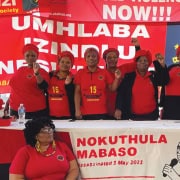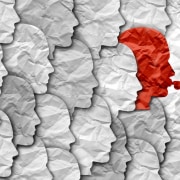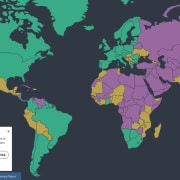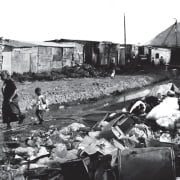|
Getting your Trinity Audio player ready...
|
Image: Flickr/Darryn van der Walt
With national elections around the corner, the numerous political parties that make up the South African government collective would have us believe that we should be voting for them because they have the interests of the people firmly located in their hearts.
However, a new report by Amnesty International (AInt), released on 23 April 2024, shows that our government is failing us when it really matters – in the provision and safeguarding of fundamental human rights.
The 2024 edition of The State of the World’s Human Rights assesses and documents human rights concerns during 2023 in 155 countries, connecting issues at global and regional levels and looking forward to the implications for the future. AInt has produced its annual report for decades and the consistent deterioration in the implementation of human rights around the world is apparent.
From the global perspective, key findings include:
- States and armed groups are breaking and bending the rules of war and racism lies at the heart of some armed conflicts and the responses to them.
- Economic crises, climate change and environmental degradation have disproportionately affected marginalised communities.
- Human rights defenders campaigning for the rights of these communities are targeted as part of a wider repression of dissent.
- The backlash has intensified against the rights of women and girls and LGBTI people.
- Incitement to hatred and other harmful content posted online against some racialised groups have increased.
- Advances in artificial intelligence are used to limit freedoms and violate human rights.
South Africans still fighting for human rights and dignity
Three decades have passed since the end of the oppressive apartheid regime in South Africa, said Amnesty International South Africa (AISA), and Freedom Day, celebrated annually on 27 April, should be a day to joyfully commemorate that milestone.
But the struggle for human rights and dignity persists, and despite the hard-fought victories against apartheid, millions of people are still grappling with the denial of their fundamental human rights.
“The right to life and dignity continues to be trampled on, and some lives are deemed more valuable than others,” said AISA executive director Shenilla Mohamed. “No one is spared – from women and girls enduring high rates of gender-based violence [GBV] to courageous human rights defenders risking their lives to expose wrongdoing and corruption.”
GBV remains rampant, with continued impunity for perpetrators. “More than a year after eight women were robbed and gang-raped by armed men while filming at an abandoned mine in Krugersdorp in July 2022, no further arrests were made and there was no justice for the victims and their families. In April, the South African Police Service (SAPS) was ordered by the Information Regulator to apologise for leaking personal information about the victims.”
The SAPS bungled the case from start to finish, and yet nobody has been held accountable within its ranks.
In the education sector, lives and dignity care still viewed as unimportant. “Despite promises to eradicate and replace illegal pit latrines by 2023, the Department of Basic Education’s Education Facilities Management report showed that 3 932 schools still used pit latrines, violating the rights to health, dignity, safety, and life.”
Meanwhile, access to safe drinking water is declining and water infrastructure is crumbling. “Department of Water and Sanitation national reports released in June revealed a decline in access to quality and safe drinking water. In 90 municipalities, 334 wastewater systems were in a critical condition, and 55% of sampled systems demonstrated poor chemical water quality compliance.”
South Africans saw the deadly effects of neglect of the water system in the May 2023 cholera outbreak in Hammanskraal. “By 22 May, 15 people had died of cholera … This rose to 23 people a week later. An independent investigation by the Water Research Commission found that inadequate sanitation and hygiene infrastructure, particularly in informal and rural settlements, as well as operational inefficiencies in treating wastewater and water to acceptable standards, enabled the rapid spread of the disease.”
This violates the right to water and sanitation, while the right to health is also in danger with the imminent introduction of the National Health Insurance Bill and its possible effect on healthcare accessibility, which is already a problem in South Africa.
Refugees and asylum seekers have rights too, though the vigilante group Operation Dudula does not agree. Among other atrocities, the group blocked these vulnerable people from gaining access to healthcare. In January, they chased foreign nationals from Johannesburg’s Jeppe Clinic.
But Operation Dudula is not the only group violating these rights – some health facilities in Gauteng continued to deny access to pregnant and lactating migrant women, and children under six, despite a South Gauteng High Court ruling which upheld their right, irrespective of nationality and documentation status, to access free health services at all public health facilities.
Right to life and safety
Crime remains at unacceptable levels, and the murder rate sits at an average of 75 people murdered each day. “During this reporting period, there were 58 cases of mass killings, involving the killing of three or more people in a single incident, resulting in 218 deaths.”
The SAPS, rather than preventing unnecessary deaths, contributes to the rising number. “SAPS officers continued to use excessive force, resulting in injuries and deaths … As of 14 February, the Independent Police Investigative Directorate was dealing with 1 060 cases of deaths as a result of police action.”
And those who expose corruption are viciously targeted, with human rights defenders, activists, journalists, and whistle-blowers continuing to face threats, intimidation, and harassment. “Police whistle-blower Patricia Mashale, who was allegedly dismissed after reporting suspicious activities by SAPS officials, went into hiding after not receiving protection.”
In September the Department of Justice and Constitutional Development made public a discussion document on proposed reforms for the whistle-blower protection regime – a document that Corruption Watch submitted comments on. But such reforms come too late for the country’s many murdered whistle-blowers, including Babita Deokaran who was brutally killed in 2021. In August six men were found guilty of her murder and given prison sentences ranging from six to 22 years. However, there is concern that these were merely the foot soldiers carrying out orders, and the people who gave the orders remain free and alive.
“As we reflect on South Africa’s journey since the end of apartheid, it is a poignant reminder that the fight for freedom, dignity and human rights is far from over,” said Mohamed.
“This year, as South Africa heads to the polls on 29 May, we have the opportunity to collectively shape the future of the country and vote for human rights. To demand a reality where justice and equality are protected, and the right to live free from violence and have access to safe, sufficient, and reliable water is realised for every person, no matter who they are, or where they live.”








